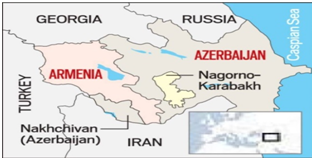Azerbaijan Launches Military Operation in Nagorno-Karabakh, Reigniting Regional Tensions
Why in news?
- Azerbaijan has launched anti-terror operations in Nagorno-Karabakh, and said it will not stop until ethnic-Armenian separatists surrender.
- In the name of this operation, Azerbaijan’s forces opened fire on Armenian positions.
- Azerbaijan and Armenia last went to war in 2020.
- Tensions in the South Caucasus have been high for months around the breakaway enclave, recognised internationally as part of Azerbaijan.
Nagorno-Karabakh Region
- Geographical location
- Nagorno-Karabakh is a mountainous and heavily forested region lying south of Caucasus mountains.
- The region includes the north-eastern flank of the Karabakh Range of the Lesser Caucasus and extends from the crest line of the range to the margin of the Kura River lowland at its foot.
- Disputed region
- Under international law, this region is recognised as part of Azerbaijan.
- However, ethnic Armenians who constitute the vast majority of the population there reject Azeri rule.
- In 1990s, Azerbaijan’s troops were pushed out of the region following a war.
- Since then, these ethnic Armenians have been in administrative control of Nagorno-Karabakh, with support from Armenia.
Origin of the dispute between Armenia and Azerbaijan
- In the early 1920s,after the Bolshevik revolution in Russia, the new Soviet rulers, established the Nagorno-Karabakh Autonomous Region, with an ethnic Armenian majority.
- This region was established within the Soviet Socialist Republic of Azerbaijan.
- As Soviet control loosened towards the end of the 1980s, smouldering Armenian-Azeri frictions exploded into violence when the region's parliament voted to join Armenia.
- During the fighting, the ethnic Armenians gained control of the region.
- They also pushed on to occupy Azerbaijani territory outside Karabakh, creating a buffer zone linking Karabakh and Armenia.
- With the break-up of the Soviet Union, in late 1991, Karabakh declared itself an independent republic, further escalating the conflict into a full-scale war.
- That de-facto status has not been recognised elsewhere.
Ceasefire & September 2020 war between Armenia and Azerbaijan
- A Russian-brokered ceasefire was signed in 1994, leaving Karabakh as well as swathes of Azeri territory around the territory in Armenian hands.
- Since the truce, a simmering stalemate prevailed until September 2020.
- In September 2020, Azerbaijani launched an offensive that recaptured territory around Karabakh.
- It resulted in the death of at least 100 civilians and Armenian combatants.
- Again, a peace deal was brokered by Russia. Under this deal, both sides decided to maintain positions in the areas that they held at that time.
- This resulted into a significant gain for Azerbaijan as it has reclaimed over 15-20% of its lost territory during the recent conflict.
What are the stakes for other countries in this region?
- Due to the involvement of regional rivals Turkey and Russia, this conflict has attracted worldwide attention.
- Muslim-majority Turkey is a NATO ally and backs Azerbaijan.
- Turkey’s support for Azerbaijan may be seen as an attempt to counter Russia’s influence in the region of South Caucasus.
- In 1991, Turkey was the first country to recognize the independence of Azerbaijan.
- On the other hand, Armenia is a member of Russian led Collective Security Treaty Organization- CSTO.
- Muslim-majority Turkey is a NATO ally and backs Azerbaijan.
- For all other countries, the region is an important transit route for the supply of oil and natural gas to the European Union.
- Some of these pipelines passes through the area which is near to the conflict zone. This could disrupt oil and gas exports from the region.
India and the dispute between Armenia and Azerbaijan
- No Specific Policy
- India does not have any specific public policy for the South Caucasus region like the 'Neighborhood First Policy' or 'Act East'.
- At the same time, India's relations with the countries of the region (Armenia, Georgia and Azerbaijan etc.) show great contrast.
- Relationship with Armenia
- India and Armenia signed a Treaty on Friendship and Cooperation in Dec. 1995.
- If the conflict in the Nagorno-Karabakh region reaches the territory of Armenia, this treaty will prohibit India from providing military or any other aid to Azerbaijan.
- Armenia has openly supported India on the Kashmir issue, while Azerbaijan has the support of Pakistan.
- Relationship with Azerbaijan
- Investments have been made in an oil field project by India's public sector company ONGC Videsh Limited in Azerbaijan.
- GAIL is exploring the possibilities of cooperation in the field of LNG.
- Azerbaijan is an important country located on the route of the International North South Transport Corridor (INSTC).
- India's demand for a peaceful resolution of the conflict through diplomatic negotiations without supporting either side is a positive step.
Source : The Hindu





.jpg)
.jpg)
























